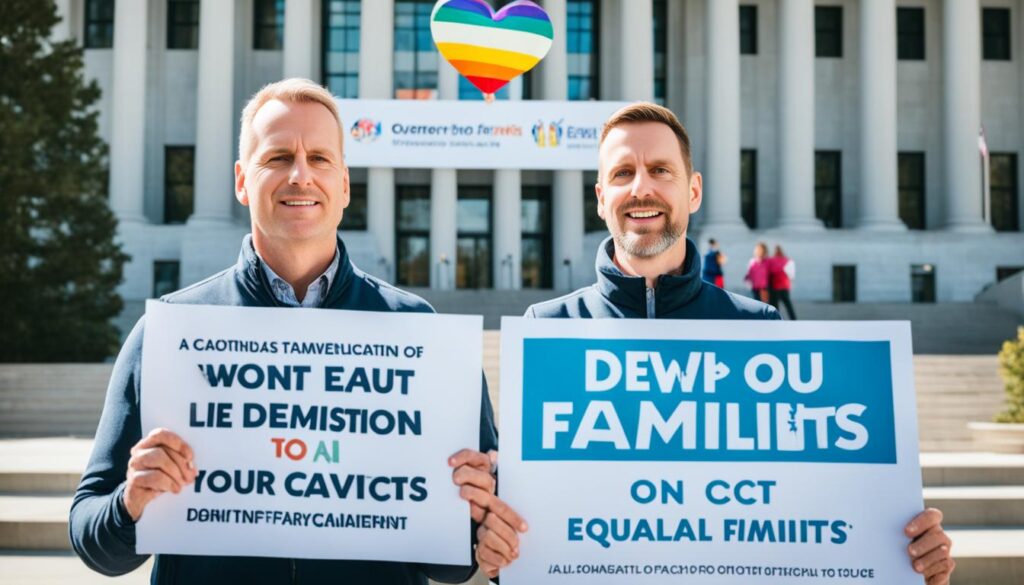In today’s digital age, LGBTQ+ parents face a unique set of challenges as they strive to navigate their children’s identities and create a safe and inclusive family environment. How can LGBTQ+ parents embrace the digital era while fostering love, acceptance, and understanding within their families?
Key Takeaways:
- Navigating LGBTQ+ parenting in the digital era requires understanding the unique challenges faced by LGBTQ+ parents.
- Creating a safe and inclusive family environment involves embracing the digital age while fostering love, acceptance, and understanding.
- Supportive insights and essential tips can help LGBTQ+ parents navigate the complexities of raising children in the digital era.
- Online communities and resources offer a sense of belonging and support for LGBTQ+ parents and their children.
- Finding inclusive children’s books and advocating for transgender youth are important aspects of LGBTQ+ parenting in the digital age.
Understanding the Impact of Anti-LGBTQ+ Legislation
Recent controversies and an increase in anti-trans and anti-LGBTQ+ legislation have created fear among LGBTQ+ parents, who worry about their children’s safety and acceptance. These discriminatory laws not only restrict the rights and freedoms of LGBTQ+ individuals but also undermine the progress made in building a more inclusive society.
However, amidst these challenges, there are positive developments as well. Some schools and educational institutions have taken steps to create safe spaces and support systems for LGBTQ+ students and parents. These safe spaces provide a haven for LGBTQ+ youth to express themselves, seek guidance, and find acceptance within their educational communities.
“Safe spaces act as a lifeline for our LGBTQ+ children, offering them a sense of belonging and a refuge from discrimination,” says Sarah Johnson, a parent and LGBTQ+ rights advocate.
By promoting inclusivity and acceptance within educational environments, these institutions contribute to the well-being and mental health of LGBTQ+ students and parents. The creation of safe spaces fosters an atmosphere where everyone is valued and respected, regardless of their sexual orientation or gender identity.
Finding Support and Advocacy
Support organizations and advocacy groups play a vital role in helping LGBTQ+ parents navigate the challenges posed by anti-LGBTQ+ legislation. These organizations provide resources, legal assistance, and emotional support to parents and families facing discrimination and bigotry.
One such organization is the Human Rights Campaign, which offers a wide range of resources and support for LGBTQ+ families. From legal guidance to educational materials, these resources empower parents to understand their rights, fight against discrimination, and create a safe and nurturing environment for their children.
The Importance of Acceptance and Safe Spaces
Creating acceptance and safe spaces is crucial for LGBTQ+ parents and their families. It not only ensures the well-being and mental health of LGBTQ+ individuals but also fosters a sense of belonging and community.
By advocating for inclusive policies and fostering open dialogue, parents and community leaders can work together to create a more accepting and supportive society. This involves challenging stereotypes, educating others about LGBTQ+ realities, and promoting empathy and understanding.
| Type of Anti-LGBTQ+ Legislation | Description |
|---|---|
| Transgender bathroom bills | These bills restrict transgender individuals from using restrooms that align with their gender identity, perpetuating discrimination and violating their rights. |
| Conversion therapy bans | Conversion therapy, also known as “reparative therapy,” aims to change an individual’s sexual orientation or gender identity. These bans prohibit the use of such harmful practices. |
| Religious exemption laws | These laws allow individuals or organizations to discriminate against LGBTQ+ individuals based on religious beliefs, impeding their access to services and protections. |
| Adoption and foster care restrictions | Some legislation limits LGBTQ+ couples’ ability to adopt or serve as foster parents, denying children loving and supportive families. |
While anti-LGBTQ+ legislation presents challenges, it is essential to recognize the progress made in creating safe spaces and advocating for acceptance. By working together and supporting one another, LGBTQ+ parents can provide their children with the love, acceptance, and nurturing environment they deserve.

Dream On Me Rock On Me 2-in-1 Baby Rocker and Stationary Seat, Adjustable Recline, Gentle Music & Vibration, 3-Point Safety Harness, Detachable Toy Bar, Folds Compact for Travel – Black & Grey
2-in-1 Rocker with Adjustable Seat - Easily switch between gentle rocking motion and a steady stationary seat using...
As an affiliate, we earn on qualifying purchases.
Finding Acceptance in the Digital Age
The digital age has paved the way for significant strides in LGBTQ+ acceptance and the normalization of queer identities. Through online communities, LGBTQ+ youth have found a sense of belonging, support, and understanding, helping to alleviate the feelings of isolation that many may experience.
These online spaces have become invaluable lifelines for LGBTQ+ children, offering a safe and inclusive environment where they can express themselves freely and connect with others who share similar experiences. By fostering a sense of community, online platforms have contributed to the overall well-being and mental health of LGBTQ+ youth.
Furthermore, the legalization of same-sex marriage has played a pivotal role in reshaping societal norms and fostering a more affirming social landscape for LGBTQ+ individuals. This landmark decision has not only granted legal recognition to same-sex relationships but has also created a powerful message of inclusion and equality.

The image above captures the essence of LGBTQ+ acceptance in the digital age, showcasing a diverse group of individuals celebrating their identities and highlighting the power of online communities in creating positive change.
In addition to ensuring immediate acceptance and support, online communities have played a crucial role in educating society about LGBTQ+ issues and fostering understanding. By promoting open dialogue and providing valuable resources, these platforms have become powerful advocates for LGBTQ+ rights and equality.
Voices of Empowerment and Resilience
“Being part of an online LGBTQ+ community has made me realize that I am not alone. It has given me the strength to embrace my true self and be proud of who I am.” – Mark, a member of an LGBTQ+ online support group.
By normalizing LGBTQ+ experiences, online communities have challenged prevailing stereotypes and misconceptions, contributing to a more inclusive and accepting society. Through these digital spaces, young LGBTQ+ individuals can find role models, celebrate their identities, and forge meaningful connections that transcend geographical boundaries.
Online Communities Supporting LGBTQ+ Youth
| Platform | Description |
|---|---|
| TrevorSpace | An online community for LGBTQ+ youth, providing support, resources, and opportunities for connection. |
| It Gets Better Project | A global movement that uplifts and empowers LGBTQ+ youth through storytelling and community building. |
| GLSEN | An organization dedicated to creating safe and supportive environments for LGBTQ+ students, both online and offline. |
Online communities continue to play a vital role in promoting LGBTQ+ acceptance and fostering a sense of belonging for LGBTQ+ youth. As these platforms evolve, it is important to recognize and celebrate their contributions in creating a more inclusive and understanding world.

Baby Swings for Infants, Monamii Baby Swing, Infant Swing with 5 Speeds, 10 Lullabies, Electric Swing for Baby, Indoor & Outdoor Use (Beige)
BABY SWINGS FOR INFANTS -- Our electric baby swing quickly calms and relaxes your baby with 5 natural...
As an affiliate, we earn on qualifying purchases.
The Power of LGBTQ+ Visibility and Acceptance
While significant progress has been made in the fight for LGBTQ+ rights and acceptance, the journey is far from over. LGBTQ+ parents understand the importance of visibility and acceptance for their children. By promoting LGBTQ+ visibility and fostering acceptance, society can create a more inclusive and affirming environment for all.

One powerful way to enhance LGBTQ+ visibility and promote acceptance is through pride events. Pride parades and gatherings, such as the iconic Pride prom, offer LGBTQ+ youth a chance to come together and celebrate their identities. These events create a sense of community, empower individuals, and demonstrate that they are not alone in their journey. By showcasing LGBTQ+ love and unity, pride events challenge stereotypes and break down barriers, contributing to greater acceptance and understanding.
It’s important to note that LGBTQ+ parents are witnessing a shift in societal attitudes. People are becoming more open-minded, recognizing that love is love, regardless of sexual orientation or gender identity. However, despite this progress, LGBTQ+ parents continue to advocate for equal rights and acceptance for their children. They understand that the fight for LGBTQ+ equality is ongoing and that visibility plays a crucial role in fostering acceptance.
“Visibility is vital for achieving LGBTQ+ acceptance in our society. When people see LGBTQ+ individuals and families in their everyday lives, it challenges misconceptions and promotes understanding. It shows that LGBTQ+ families are just like any other, filled with love and care.” – Sarah Johnson, LGBTQ+ Parent
To showcase the progress made and to inspire further change, it’s essential to highlight stories of LGBTQ+ individuals and families. By sharing personal experiences, struggles, and triumphs, LGBTQ+ individuals and their parents contribute to the narrative of LGBTQ+ visibility and acceptance. These stories serve as a powerful reminder that LGBTQ+ people deserve equal respect, opportunities, and rights.
In order to continue the progress towards LGBTQ+ visibility and acceptance, it’s important for society to actively support and uplift LGBTQ+ voices. This can be done through various means, such as media representation, inclusive education, and supportive policies. By embracing LGBTQ+ diversity and celebrating LGBTQ+ families, we create a world where everyone can thrive, regardless of their sexual orientation or gender identity.
LGBTQ+ Visibility and Acceptance Statistics
| Statistic | Percentage/Number |
|---|---|
| Percentage of Americans who support same-sex marriage | 67% |
| Number of pride parades hosted worldwide in 2022 | over 300 |
| Percentage increase in LGBTQ+ representation in TV shows from 2015 to 2020 | 152% |
| Number of countries where same-sex sexual activity is illegal | 68 |

Joie Cinnamon 2-in-1 Glider and Rocker – Multi-Motion Baby Swing and Rocker Combo with Plush Fabrics, Compact Design, and Multiple Recline Positions – Soothing Sounds & Gentle Vibrations (Fern)
2-in-1 Glider & Rocker Combo: The Joie cinnamon 2-in-1 is a versatile baby swing that doubles as a...
As an affiliate, we earn on qualifying purchases.
Navigating Laws and Policies Affecting LGBTQ+ Families

LGBTQ+ families face numerous challenges as they navigate through discriminatory laws and policies that directly impact their lives. In recent years, there has been an alarming increase in the introduction of anti-LGBTQ+ bills in state legislatures, targeting both LGBTQ+ youth and families. Unfortunately, in 2023 alone, over 550 such bills were proposed, posing significant threats to the safety and well-being of LGBTQ+ individuals.
These discriminatory laws and policies perpetuate a climate of inequality and discrimination against LGBTQ+ families. They create barriers to accessing essential services, legal protections, and societal recognition. LGBTQ+ parents face ongoing challenges in ensuring their rights and protections as parents are respected and upheld.
It can be challenging for LGBTQ+ parents to keep up with the ever-changing legal landscape. Understanding the nuances of laws and policies that affect their families requires significant effort and dedication. This endeavor places an additional burden on LGBTQ+ parents, who already face unique obstacles as they strive to create a loving and inclusive environment for their children.
In their pursuit of equality and equal treatment, LGBTQ+ families often find themselves at the forefront of advocacy efforts. They work tirelessly to challenge discriminatory laws and push for legislative changes that will protect and support their families. Through grassroots organizing, legal battles, and community engagement, these families are breaking down barriers and fighting for the rights they deserve.
Discriminatory laws and policies target the most vulnerable members of our society – our children. By targeting LGBTQ+ youth and families, these laws perpetuate harmful stereotypes, isolate individuals from necessary support systems, and hinder the progress we have made towards equality and acceptance.
It is crucial for society as a whole to recognize the detrimental impact of these discriminatory laws and policies. The fight for LGBTQ+ equality is not limited to legislative changes alone. It demands dialogue, education, and a commitment to creating a more inclusive and accepting society for all.
Supporting Legislation and Challenging Discrimination
Various organizations and advocacy groups are working tirelessly to support LGBTQ+ families and challenge discriminatory laws. These organizations offer legal resources, support networks, and assistance to LGBTQ+ parents navigating the complex legal landscape. By uniting forces, they increase visibility, provide education, and fight for the rights that LGBTQ+ families deserve.
Amidst the challenges, positive changes are being achieved. Courts are making landmark decisions affirming the rights of LGBTQ+ individuals and families. Legislative efforts are underway to promote equality and inclusivity. These advancements reflect a societal shift towards acceptance and understanding, but the fight is far from over.
| Challenged Laws and Policies | Consequences for LGBTQ+ Families |
|---|---|
| Conversion therapy bans | Protect LGBTQ+ youth from harmful practices |
| Marriage equality | Ensure legal recognition and protection for LGBTQ+ families |
| Adoption and foster care restrictions | Hinder LGBTQ+ parents’ ability to expand their families |
| Discrimination in healthcare | Obstruct LGBTQ+ families’ access to inclusive medical care |
The fight against discriminatory laws and policies is ongoing, and the resilience of LGBTQ+ families should not be underestimated. Together, we must continue to advocate for equal rights, challenge discrimination, and create a world where all families are treated with dignity and respect.

Dream On Me Rock On Me 2-in-1 Baby Rocker and Stationary Seat, Adjustable Recline, Gentle Music & Vibration, 3-Point Safety Harness, Detachable Toy Bar, Folds Compact for Travel – Grey
2-in-1 Rocker with Adjustable Seat - Easily switch between gentle rocking motion and a steady stationary seat using...
As an affiliate, we earn on qualifying purchases.
Building an Inclusive Library for LGBTQ+ Children
Fostering acceptance and understanding is crucial when raising LGBTQ+ children. An important way to achieve this is by providing inclusive books that represent LGBTQ+ families and diverse identities. These books not only help children see themselves reflected in literature but also educate readers about the beauty of different family compositions.
Inclusive books are a powerful tool for teaching empathy, promoting acceptance, and challenging stereotypes. By exploring LGBTQ+ representation and diverse families through literature, children gain a deeper understanding of the world around them and learn to celebrate differences.
“Inclusive books have the power to open hearts and minds, enabling children to develop an appreciation for LGBTQ+ families and all types of love.” – Emma Johnson, LGBTQ+ advocate
Family Equality, a leading organization advocating for LGBTQ+ families, offers a curated database of inclusive children’s books. Their collection celebrates the diversity of LGBTQ+ families and provides parents, educators, and librarians with valuable resources.
Why are inclusive books important?
- Inclusive books foster a sense of belonging and acceptance for LGBTQ+ children, validating their experiences and identities.
- They create opportunities for open and meaningful conversations about diversity, respect, and love.
- These books help challenge heteronormative narratives and break down societal barriers.
- By introducing diverse characters and families, inclusive books promote a more inclusive society where everyone feels seen and valued.
Choosing inclusive books
When selecting inclusive books for your children or classroom, consider the following:
- LGBTQ+ representation: Look for books that feature LGBTQ+ characters and storylines, allowing children to connect with and see themselves in the narrative.
- Diverse families: Seek out books that showcase diverse family structures, including same-sex parents, transgender parents, single parents, and extended families.
- Authenticity and accuracy: Ensure that the books you choose portray LGBTQ+ characters and families authentically and respectfully, avoiding harmful stereotypes.

Remember, inclusive books have the power to shape young minds and inspire a future built on acceptance and equality. By incorporating these books into our libraries, we can create a world where all children can see themselves and their families represented in the stories they read.
Supporting Transgender Youth
Parents of transgender youth face unique challenges in advocating for their children’s rights and well-being. It’s crucial for parents to educate themselves, advocate for their child in medical and educational settings, and find support within their communities. Family Equality provides resources and support for parents of transgender youth.
Educating and Empowering Parents
Understanding the experiences and needs of transgender youth is essential for parents to provide the best support. By educating themselves about gender identity, transgender healthcare, and legal rights, parents can become strong advocates for their children. Online resources, webinars, and workshops offered by organizations like Family Equality empower parents with the knowledge and skills needed to navigate the challenges of raising a transgender child.
Advocating within Medical and Educational Systems
Navigating medical and educational systems can be daunting for parents of transgender youth. It’s important to advocate for your child’s rights and ensure they receive affirming and inclusive care. This may involve working closely with healthcare providers, therapists, and school administrators to create a supportive environment. Family Equality offers guidance on navigating these systems and connecting with professionals who specialize in transgender healthcare and education.
Finding Support and Building Community
Building a strong support network is crucial for parents of transgender youth. Connecting with other parents who are going through similar experiences can provide a sense of belonging and understanding. Family Equality offers support groups, online forums, and community events where parents can connect, share experiences, and find guidance. It’s important to surround yourself and your child with accepting and supportive individuals who can offer emotional support and practical advice.
“Finding support and understanding from other parents of transgender youth has been invaluable. It’s a reminder that we are not alone in this journey, and together, we can create a more inclusive and accepting world for our children.” – Parent of a transgender youth
Advocacy and Policy Change
Advocacy plays a crucial role in creating a more inclusive society for transgender youth. By taking part in local and national advocacy efforts, parents can raise awareness, challenge harmful policies, and push for legislation that protects and affirms transgender rights. Family Equality provides resources and guidance on advocacy strategies, connecting parents with opportunities to make a difference and create lasting change.
Supporting Transgender Youth: A Path to Empowerment and Inclusion
Supporting transgender youth requires the unwavering commitment of parents and a strong network of support. Educating oneself, advocating within medical and educational systems, finding support and building community, and engaging in advocacy and policy change are crucial steps toward empowering transgender youth and creating a more inclusive society. Family Equality stands as a beacon of support, providing resources, guidance, and a community of understanding for parents of transgender youth.
| Support for Transgender Youth | How Family Equality Can Help |
|---|---|
| Education and Resources | Access to comprehensive guides, webinars, and articles on supporting transgender youth |
| Support Groups | Connections to local and online support groups for parents of transgender youth |
| Advocacy Training | Tools and resources for advocating for transgender rights at the local and national level |
| Professional Network | Connections to healthcare professionals and educators specializing in transgender healthcare and education |

LGBTQ+ Parents on Social Media
LGBTQ+ parents are harnessing the power of social media to connect with others, share their experiences, and find support within their communities. Platforms like Facebook, Instagram, and Twitter have become valuable spaces for LGBTQ+ parents to exchange tips, seek advice, and create a sense of belonging.
These parents often use social media not only as a means of communication but also as an unintentional act of advocacy. By sharing their everyday lives, celebrations, and challenges, they contribute to the visibility and acceptance of LGBTQ+ families. Their posts serve as powerful reminders of the love and joy that exist within their households.
“When I share pictures of my family on Instagram, I hope to show the world that love knows no boundaries,” says Rebecca, a proud LGBTQ+ parent. “It’s a way for me to advocate for our rights and break down stereotypes.”
Privacy, however, becomes a complex issue as LGBTQ+ parents navigate the digital landscape with their partners, children, and extended families. They must strike a balance between sharing their lives and protecting their family’s privacy.
Moreover, social media can also expose LGBTQ+ parents to disapproval and prejudice. Negative comments and messages can be hurtful, but many LGBTQ+ parents find solace in online communities that offer support, advice, and encouragement.
Advocating for LGBTQ+ Rights
Social media has been instrumental in driving advocacy efforts for LGBTQ+ rights. LGBTQ+ parents use platforms to raise awareness about important issues, share resources, and mobilize support. Through hashtags, online campaigns, and viral posts, they contribute to the advancement of LGBTQ+ rights and the creation of a more inclusive society.
By amplifying their voices and experiences, LGBTQ+ parents have the opportunity to challenge misconceptions and promote understanding. They play a crucial role in shaping public opinion, influencing policy changes, and building a more accepting world for future generations.
Whether it’s sharing stories of personal triumphs or engaging in online activism, LGBTQ+ parents on social media are making a significant impact on the visibility and acceptance of LGBTQ+ families.
Supportive Communities and Resources
Social media platforms offer a multitude of LGBTQ+ parenting groups, communities, and resources. These digital spaces provide opportunities for LGBTQ+ parents to connect with others who share their experiences, challenges, and triumphs. From online support groups to forums and blogs, these communities offer a safe and welcoming environment where LGBTQ+ parents can seek advice, find resources, and build lasting friendships.
Family Equality (@familyequality) is an example of an organization that leverages social media to connect LGBTQ+ parents and provide valuable support. They offer resources, webinars, and virtual events that address the unique needs of LGBTQ+ parents and their children.

| Social Media Platform | Benefits |
|---|---|
|
|
|
|
|
By tapping into the power of social media, LGBTQ+ parents can find the support, resources, and connections they need to navigate their unique parenting journeys.
Balancing Privacy and Disclosure Online
LGBT parents face the challenge of managing privacy and disclosure online while navigating the complexities of sharing their personal lives on social media. In an era where our lives are increasingly interconnected and public, protecting their families’ privacy becomes a paramount concern.
Social media platforms offer a powerful space for LGBTQ+ parents to connect, find support, and raise awareness about important issues. However, they also present potential risks to privacy, as information shared online can be accessed by a wide audience. Balancing the desire to share their experiences with the need for privacy is a delicate task that many LGBTQ+ parents face.
One of the major considerations in balancing privacy and disclosure online is the rapidly shifting social movements surrounding LGBTQ+ rights and acceptance. While increased visibility and acceptance are positive outcomes of these movements, they also create a profound impact on the privacy dynamics for LGBTQ+ parents.
The need for visibility and representation has given rise to more LGBTQ+ families sharing their stories openly, advocating for their rights, and challenging societal norms. However, the more visible and active individuals are online, the more their personal lives might become subject to scrutiny and potential risks.
Despite these challenges, many LGBTQ+ parents find empowerment in sharing their stories and experiences. They recognize the importance of representation and the positive impact it can have on others who may be struggling with their identities or facing similar challenges.
“Sharing our stories allows us to create meaningful connections, find support, and contribute to changing hearts and minds. It helps us move closer to a world where LGBTQ+ families are fully accepted and celebrated,” says Sarah Johnson, a proud LGBTQ+ parent and advocate.
To strike a balance between privacy and disclosure, LGBTQ+ parents often adopt various strategies. Some choose to control the visibility of their content by using privacy settings and selective sharing with a limited group of trusted individuals. Others create separate accounts specifically for discussing LGBTQ+ parenting topics, ensuring a level of anonymity while still engaging in important conversations.
Additionally, LGBTQ+ parents may also be cautious about revealing personal details that could potentially compromise their family’s safety. They may refrain from sharing specific locations, school names, or any identifying information that could expose their children to potential harm.
Safe Practices for LGBTQ+ Parents Online:
- Regularly review and update privacy settings on social media platforms to control who can see your posts and personal information.
- Consider creating separate accounts for LGBTQ+ parenting discussions, creating a space that allows for open and genuine conversations while maintaining privacy.
- Avoid sharing sensitive personal information, such as specific locations or identifying details that could compromise your family’s safety.
- Be mindful of the potential consequences of sharing personal stories or images, ensuring that your disclosures align with your family’s comfort level and overall well-being.
- Engage in online communities and support networks that foster understanding and provide valuable resources for LGBTQ+ parents.
Conclusion
Navigating LGBTQ+ parenting in the digital age can be challenging, but with the right support and resources, it is possible to create a nurturing and inclusive family environment. Understanding the impact of anti-LGBTQ+ legislation is crucial, as it helps parents protect their children’s rights and ensure their safety. It is also important to find acceptance both in the online and offline world, as this fosters a sense of belonging and self-acceptance in LGBTQ+ youth.
By balancing privacy and disclosure online, LGBTQ+ parents can maintain a sense of control over their family’s personal information while still advocating for visibility and acceptance. Additionally, accessing supportive resources and communities is vital for LGBTQ+ parents as they navigate the complexities of parenthood in the digital age.
In conclusion, LGBTQ+ parenting in the digital age requires resilience, empathy, and an understanding of the unique challenges faced by LGBTQ+ families. With a commitment to love, acceptance, and the right supportive resources, LGBTQ+ parents can create a safe and inclusive environment where their children can thrive.









